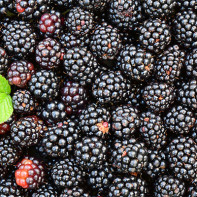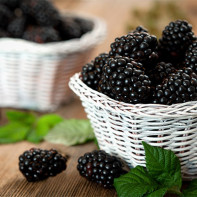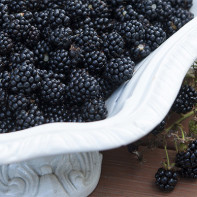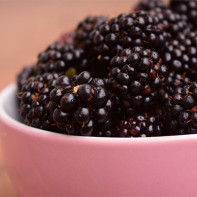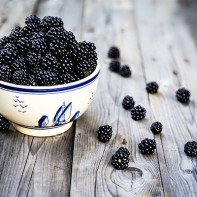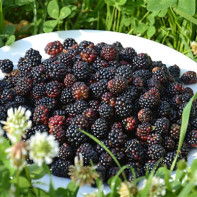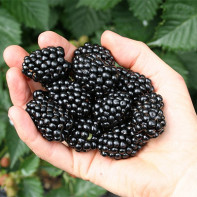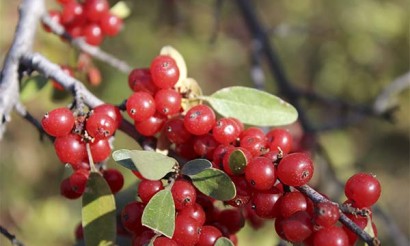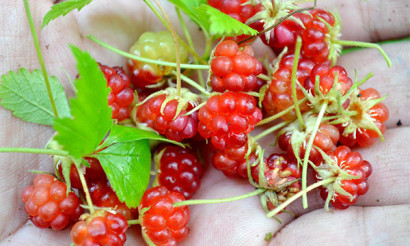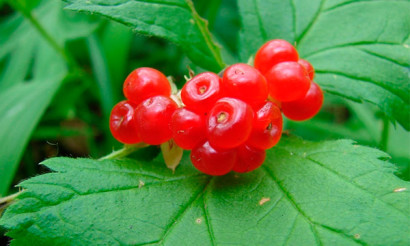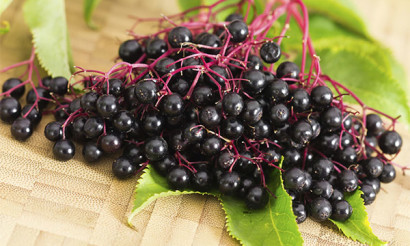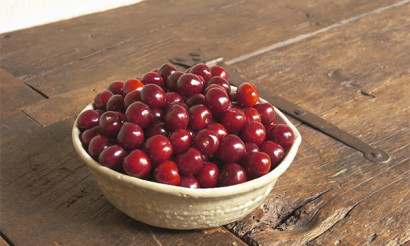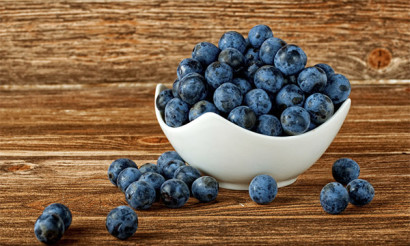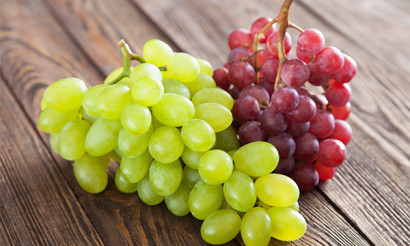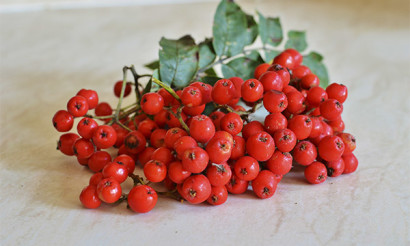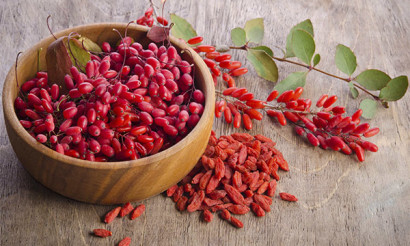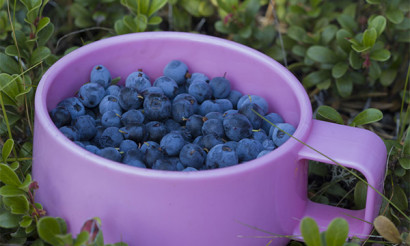Blackberry: useful properties and contraindications.
Blackberry is a berry belonging to the subgenus Rubus and family Pink. Let's consider in more detail what it is, its medicinal properties and contraindications.
- What is a blackberry and how it looks like
- What is the difference between blackberries and raspberries
- What is more useful: raspberries or blackberries
- Composition and calories
- The useful properties of blackberries
- General health benefits
- For women
- For men
- In pregnancy
- Breastfeeding
- For kids
- For weight loss
- What are the health benefits of blackberry leaves
- The benefits of frozen blackberries
- Blackberry in medicine
- Diabetes mellitus
- In pancreatitis
- For gastritis
- For gout
- Recipes of traditional medicine based on blackberries
- Blackberry and raspberry tea for colds
- Infusion to gargle mouth and throat
- Blackberry in cosmetology
- For Face
- For Hair
- Harm and Contraindications
- How to choose and store blackberries
- What can be made with blackberries: Recipes
- Compote
- Smoothies
- Jam
- Frozen blackberry morsel
- Blackberry sauce with meat
- Interesting facts about blackberries
What is a blackberry and what does it look like?
In appearance, it is similar to raspberries, but has a darker color, usually black (sometimes you can meet fruits with a rich red hue), has a pleasant sweet taste.
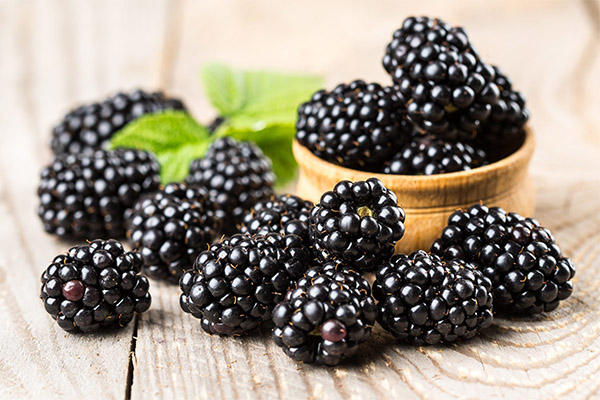
The berry has a rather specific smell. In total, there are about 300 varieties. Although the exact origin of the blackberry is unknown, it is assumed that the crop came from Asia, North America or Europe. It was particularly popular with the ancient Greeks and Romans. Up to a certain point, the plant was considered wild and not much attention was paid to it. But when it became known of its many benefits, blackberries were actively cultivated.
What is the difference between blackberries and raspberries
The blackberry is a berry that has a black color and grows on a low shrub. Outwardly it is very similar to all of us known raspberries. During growth and ripening, the berry acquires a brownish hue at first, and then turns a rich red color. The mature berry has a bright black-purple color.
Raspberries are sweet flavored berries that have a red hue. As a rule, raspberries are grown by gardeners on their plots. It can also grow in the wild, in the forest and on the banks of rivers. The berry is thought to have originated in Asia, from where it spread to the Mediterranean and Europe and later became known around the world.
It is believed that berries are quite easy to distinguish just by their color, but this is not always the case. Unripe blackberries are red and some varieties have black berries. Therefore, to judge whether it is a blackberry or a raspberry, based only on their color, it is better to pay attention to the bush. For example, the blackberry has stronger twigs and can grow to 300 cm, contrary to the raspberry whose bushes are usually about 150 cm high. Blackberry thorns are quite thick, similar to the thorns of roses. Raspberry thorns are softer, but there are more of them, and they are more densely planted on the stem.
Another peculiarity of blackberries is that it is not so easy to remove the berries from the peduncle during picking. As a rule, the fruit comes off with the kernel. This does not happen when picking raspberries, because the berry itself is softer, so the separation from the flowerpod is easy. Raspberries are hollow inside, while blackberries have a core. Comparing the taste, blackberries have a rather specific taste, while raspberries are sweeter.
The yield of blackberries is higher and the fruits have a larger size. If we talk about wild raspberries, they have smaller berries. It is worth noting that it is quite rare to find wild blackberries, unlike raspberries, which grow everywhere. Raspberries usually ripen by mid-summer, blackberries by mid-August.
Which is healthier: raspberries or blackberries
Blackberries
- Blackberries contain a lot of vitamin C, so this berry can be included in the therapeutic and prophylactic diet, it will help protect the body from various infections and colds.
- The berry also contains phytoestrogens, compounds that support the body during premenstrual syndrome.
- Antioxidants, which are rich in blackberries, fight the appearance of wrinkles and help maintain youthfulness. Therefore, the consumption of this berry has a beneficial effect on the body, which is sure to affect the appearance and maintain the natural beauty.
- Bilberry has properties that make it support the cardiovascular system, prevents the emergence of various heart diseases, and also helps to reduce blood pressure. To get rid of hypertension, you need to eat a glass of blackberries every day.
- Blackberries are recommended to include in the diet of diabetics, because it causes a decrease in sugar levels.
- For better absorption of calcium and strength of teeth, it is recommended to consume this berry on a regular basis.
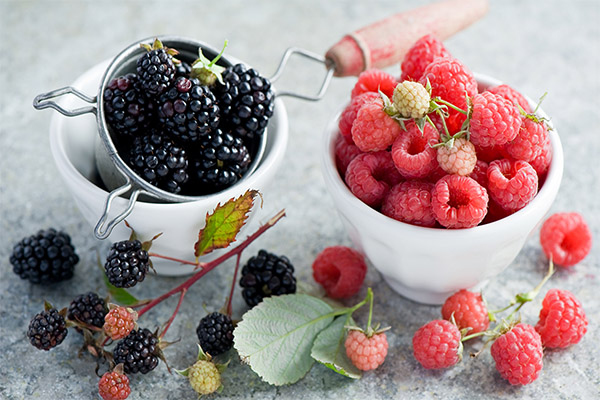
Raspberries
- Raspberries are also very useful for the body. It contains vitamins A, B and E. Although it is not very rich in vitamin C, it contains substances that help the absorption of this vitamin.
- Raspberries have anti-cold properties. It is worth noting that raspberries do not lose their properties even after heat treatment. Not only the fruits are considered useful, but also the leaves, on the basis of which you can make a delicious tea.
- Raspberries also promote weight loss. The berries contain substances that can break down fat and cellulite. To get rid of extra pounds, it is recommended to eat 0.5 cup of raspberries before a meal.
- In the East at one time this berry was used as an effective remedy for infertility, because it contains folic acid.
- Raspberries are beneficial to the heart, that is why it is recommended to eat for heart patients. The berries help reduce cholesterol, they are also rich in copper, a mineral that supports the nervous system.
- The zinc in raspberries increases libido in both men and women.
In fact, it is very difficult to answer the question of whether blackberries or raspberries are healthier. Blackberries are very useful for women of age, as well as recommended for people suffering from chronic or seasonal colds. Raspberries are suitable for diabetics and people who have heart problems.
Composition and calories
In 100 g of the product contains:
- Calories - 43 kcal.
- Protein - 1,4 g.
- Fats - 0,5 gr.
- Carbohydrates - 9,6 g.
Bramble contains 88.17 g of water, 0.37 g of ash, 5.3 g of fiber, 4.9 g of sugar.
There are many minerals: calcium, phosphorus, potassium, iron, magnesium, manganese, zinc, copper, etc.
The vitamin composition is quite rich:
- Water-soluble - vitamins C, B1, B2, B5, B6, B3 (PP), B4 and B9;
- fat-soluble - A, beta-carotene, E and K.
100 grams of blackberries contain 14% of the recommended daily allowance of fiber, as well as 23 milligrams of vitamin C, which is 35% of the recommended daily allowance. In addition to vitamin C, blackberries also contain vitamins A, E and K. The latter helps in the muscle relaxation process, so some women consume blackberries to relieve pain during childbirth.
Blackberries contain copper, which is essential for maintaining bone health. Copper is also involved in the production of white and red blood cells. The berry has B vitamins and also contains folic acid, riboflavin, pantothenic acid and niacin.
Useful properties of blackberries
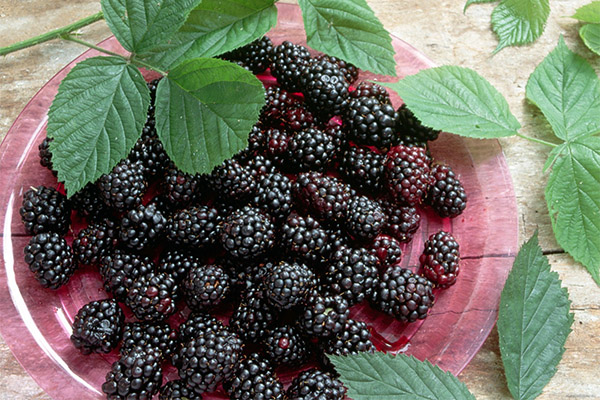
General benefits
- Fights free radicals. Anthocyanosides and polyphenols, these antioxidants found in blackberries, help fight free radicals.
- Moisturizes the skin. Blackberries have more than 50% water and also have a lot of fiber. Both of these components are essential for healthy skin. Consumption of blackberries removes toxins from the body and maintains skin elasticity. It is also worth noting that the berry contains collagen-forming vitamins C and A, which support skin health. Bramble is also great for cleansing and detoxifying oily skin. Vitamins A, C and K help rejuvenate the epidermis.
- Supports healthy hair. The high antioxidant content of blackberries makes them ideal for hair care. Vitamin C in the fruit is largely responsible for collagen production and helps strengthen hair. Antioxidants help fight the harmful effects of the environment on the hair.
- It is rich in fiber. One cup of berries contains about 8 grams of fiber. Dietary fiber contributes to energy production and gives a feeling of fullness. Fiber is also involved in the digestive process.
- Supports brain health. Eating blackberries can support brain health and prevent memory loss in old age. The antioxidants in berries help fight free radicals and have a positive effect on the interaction of brain neurons.
- Contains manganese. Manganese is a vital mineral that supports immune system health. It also helps the body absorb carbohydrates, amino acids, and cholesterol. Like vitamin C, manganese plays a key role in collagen formation. It can prevent osteoporosis, regulate blood sugar levels and reduce the incidence of epileptic seizures. One cup of blackberries contains about 1 milligram of manganese, almost half the recommended daily allowance.
- An excellent source of vitamin K. It is involved in the blood clotting process. This vitamin also plays a role in maintaining strong bones. Vitamin K deficiency can lead to thinning of bone tissue. Also its deficiency can provoke heavy menstrual bleeding and the occurrence of blood in the feces or urine. Just one cup of berries contains about 29 micrograms of vitamin K, more than a third of the recommended daily allowance.
- Maintains oral health. Regular consumption of blackberries supports oral health. Blackberries contain rutin, gallic acid and ellagic acid. These natural phenolic antioxidants found in fruits and vegetables have anti-carcinogenic and antibacterial properties. Bramble destroys pathogens in the mouth. It also has antiviral properties, useful for treating periodontal disease.
- Exhibits anti-cancer properties. Micronutrients in blackberries prevent the growth and spread of malignant cells. Anthocyanins and phytochemicals in the fruit inhibit tumor growth.
- Supports heart health. The anthocyanins in blackberries promote heart health. The fiber and magnesium content prevents clogged arteries and ensures normal blood flow, which is especially important during pregnancy.
For women
Blackberry teas and decoctions are very useful for women with gynecological problems. Blackberries are recommended to use in cases of severe manifestations of menopause, as well as in periods of premenstrual syndrome, with menstrual pain, edema, hormonal disorders, because the substances they contain help normalize blood pressure and hormonal background.
For men
Blackberries are also very useful for men. Berries are rich in fiber, which is necessary for detoxification of the body. One cup of blackberries contains about 8 grams of dietary fiber. The berry is also an excellent source of vitamins C and K, which help prevent prostate cancer. The fruit has lutein, which supports eye health.
When pregnant
Pregnant women are allowed to eat blackberries. The main thing is to choose a product without any additives, and also do not forget that before consuming the berry should be thoroughly washed. Unripe berries should be excluded from the diet, because they can cause abdominal pain or even lead to food poisoning.
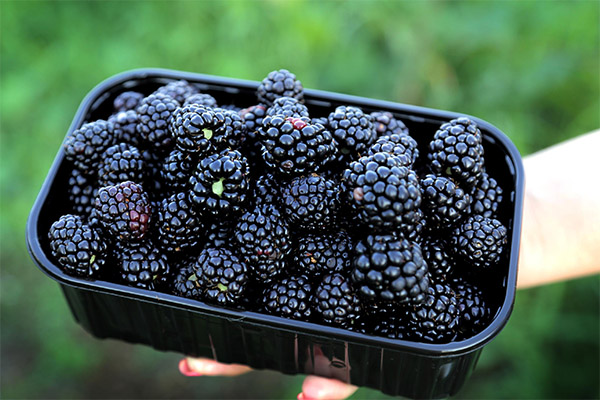
Health benefits of blackberries during pregnancy:
- Energizing. Blackberries are a natural source of energy and prevent fatigue, especially when consumed late in pregnancy. During this period, a pregnant woman usually feels constant physical exhaustion, so it is highly recommended to consume blackberries.
- Prevents the occurrence of constipation. Constipation is a very common problem faced by most pregnant women. Bramble contains fiber, which supports digestive processes, promotes easy and effective absorption of water in the intestines.
- It prevents birth defects. Blackberries contain folate, a vital nutrient that prevents birth defects in the baby and can also remove the threat of miscarriage. Moreover, regular consumption of berries can prevent birth defects in a baby's heart.
- Supports bone health. As a rich source of calcium and magnesium, blackberries help strengthen teeth and support bones during critical periods of pregnancy. The minerals and nutrient content of the berries also helps strengthen baby's bones and support their growth and development.
- Prevents bleeding. Blackberries are a source of vitamin K, which is involved in the blood-clotting process and can prevent excessive bleeding, especially during pregnancy. Consumption of blackberries promotes rapid healing of wounds and prevents osteoporosis.
When breastfeeding
If the nursing woman is not allergic to blackberries, then this berry is allowed to eat. Blackberries are very nutritious because they contain vitamin C, folic acid, iron, potassium and dietary fiber. All of these vitamins and minerals can benefit growing babies through breast milk. But it should be introduced into the diet gradually and not earlier than 1 month after delivery.
For babies.
As soon as the baby begins to wean and eat solid food, you can gradually introduce blackberries into his daily diet. The best time to include blackberries in your baby's diet is after four to six months. The recommended dose of blackberries for a six-month-old baby should be about 1-2 cups. Remember to give your baby crushed berries at first, so that it is easier for the baby's stomach to digest them.
Blackberries support your baby's digestive tract and improve the health of his skin. The antioxidants present in the berry minimize the risk of cancer. Calcium and magnesium help healthy bone development in your baby.
Despite the benefits of berries, allergic reactions may also occur. Consult your doctor if your baby experiences rashes, vomiting, diarrhea, coughing, facial swelling and abdominal cramps after consuming blackberries.
For weight loss.
Blackberries are rich in a specific type of flavonoids (anthocyanins), which are also found in strawberries, cherries, blueberries, grapes, radishes and black currants. These compounds keep the immune system healthy. When the immune system is strong, the body is able to function more efficiently. This often helps to normalize weight without problems.
There are only 43 calories in 100 grams of the product. It is important to note the fact that blackberries are among the berries that contain the least amount of sugar, so they are very useful for people who lose weight.
Blackberries are also rich in fiber. The dietary fiber helps you feel full after a meal, so people on a diet don't have to resort to snacking or other liberties. In addition, fiber helps the digestive system work more efficiently. This leads to the fact that extra weight and toxins do not accumulate in the body.
What are the benefits of blackberry leaves
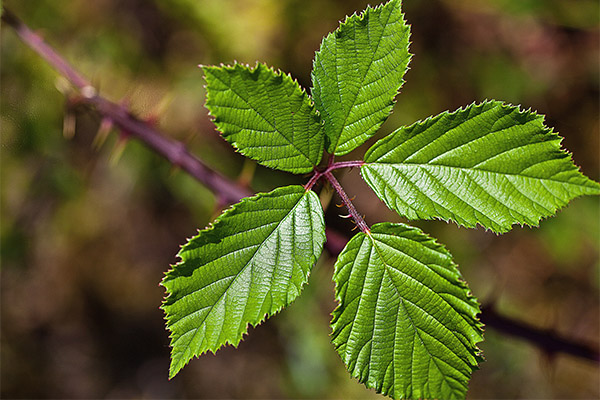
- Promote oral health. Blackberry leaves have antibacterial properties. Infusions of blackberry leaves are used to maintain oral health.
- Treat diarrhea. Diarrhea is a fairly common problem, and sometimes it can occur quite unexpectedly. The best way to fight it is to treat it with herbs. Blackberry leaves just have the necessary nutrients that help get rid of gastric distress. The most effective remedy in this case is considered a tea based on blackberry leaves.
- Support the immune system. Blackberry leaves are rich in flavonoids, compounds that support the immune system. In addition, the flavonoid content protects the body from bacteria and viruses.
- It cures ulcers. Blackberry leaves have antibacterial properties and are effective in fighting ulcer bacteria. Thus, ulcers can be treated by applying blackberry extract to them.
- Eliminate hemorrhoids. Blackberry leaves have properties that help soothe the symptoms of hemorrhoids.
- Support heart health. Blackberry leaves are high in flavonoids. They are essential for preventing cardiovascular disease. They also support cells, organs and overall health. Blackberry leaf extract is good for heart health.
- Rich in antioxidants. Blackberry leaves contain a lot of antioxidants that can fight free radicals. Tea brewed with blackberry leaves will be beneficial to everyone.
Is blackberry leaf tea useful?
Decoctions and teas from blackberry leaves are very useful for the body. They are recommended to be consumed in cases of anemia, and should also include this product in the diet of middle-aged women. This is an excellent sedative that can help guard against neurosis. Children can be given this tea after 2-3 years.
The benefits of frozen blackberries
After freezing berries lose about 10% of their useful components.
Useful properties of frozen blackberries:
- Supports the cardiovascular system and strengthens the heart muscle.
- Strengthens and cleanses blood vessels of toxins, promotes blood thinning.
- Relieves inflammation in the internal organs.
- Normalizes the work of the gastrointestinal tract, normalizes digestion.
- Helps to fight diseases of the central nervous system.
It is worth noting that this product is contraindicated for people suffering from chronic kidney disease. Berries should also not be used in the case of colitis and stomach ulcers.
Bramble in medicine
Blackberries are widely used in the field of medicine. The berries help to strengthen the body, since they contain many vitamins and trace elements. It is worth noting that the leaves of the plant are also very useful, from which decoctions can be made to rinse the mouth. They are also used to make lotions for ulcers and as a diuretic and sedative. Fresh leaves can also be used for treating skin lesions.
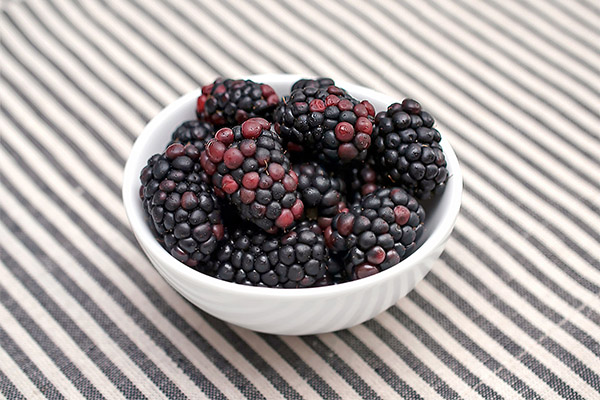
For Diabetes Mellitus
Diabetes mellitus is allowed to eat blackberries both raw and as a component of various desserts and juices. It is a quickly digestible product, so you should not be afraid of accumulation of fat deposits. It contains few calories, has a low glycemic index (25) and low calories. Therefore, blackberries do not allow the development of obesity in diabetics. Vegetable sugars, which are part of the chemical composition of berries, do not overload the pancreas, normalize the glucose in the blood and urine. However, use blackberries with caution, because it contains glucose.
In pancreatitis
If we talk about whether it is allowed to eat blackberries with pancreatitis, then we can say with certainty that yes. However, everything is good in moderation, so in this disease you need to carefully monitor the food you eat. Blackberries can be eaten in small quantities and only in periods of remission. With an exacerbation of pancreatitis, it is forbidden to eat berries.
Gastritis
With gastritis, as a rule, on the basis of blackberries prepare special infusions. But you should not forget about fresh berries, as well as juices. Blackberry juice is a very useful drink, and if you make a mix with juice from the leaves, you will get an effective remedy to combat diarrhea and gastritis.
For gout.
Blackberries contain quite a lot of oxalates, so it is recommended to consume it in small quantities in gout. At the same time, blackberries are rich in fructose, which can contribute to the aggravation of the disease of gout. The berries also contain antioxidants, which can be a prophylactic against gout attacks and also help reduce uric acid levels. Therefore, the decision of whether or not to eat blackberries for gout should be made based on how you feel.
Recipes of traditional medicine based on blackberries
Blackberries are very often used in various folk medicine recipes. The berry can be consumed in its natural form, make drinks, tinctures, compotes and brew jams from berries. Here are some recipes:
Blackberry and raspberry tea for colds
Take fresh leaves of blackberries (2/3) and raspberries (1/3). It is necessary to mix them and leave them until they begin to wilt. After that, the leaves should be kneaded with a rolling pin, splash water on them, put them in a bag (cloth) and put in a warm place. After a couple of days, when the leaves have a characteristic smell, they should be dried and stored in glass jars. After that, the tea can be brewed.
To brew the tea you will need 1 cup of boiling water and 1 tsp of the resulting raw materials.
Infusion to rinse the mouth and throat
In boiling water (1 liter) place 3 tbsp. dried raw materials (crushed). Allow to infuse for 30 minutes. Strain. Gargle with throat.
Bramble in cosmetology
Blackberries contain a large number of useful substances, which are necessary for a beautiful and healthy appearance.
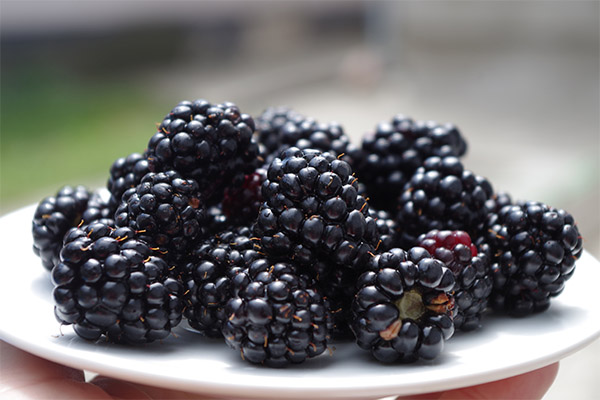
For the face
- Anti-inflammatory mask. Expose the crushed blackberry leaves to boiling water, place them in gauze, and then put the mask on the face for 20 minutes. Do not wash off.
- Refreshing mask. Crush the berries to the consistency of puree. Take 2 tablespoons of the resulting mixture and 2 tablespoons of cream, mix and apply the mask on your face for 15 minutes.
- Rejuvenating mask. Mashed potato berries to the consistency of a puree and squeeze out the juice. Take 100 ml. of juice, 3 tbsp. of sour cream, mix and apply the mask to face, decollete area and neck for 20-30 minutes.
For hair
Natural dyes have a huge advantage over artificial ones, as they help to maintain beautiful and healthy hair. Natural dyes are not harmful to the hair, and even the opposite - give natural color and shine. Bramble refers to natural dyes, so it is often used for hair dyeing. Let's consider a recipe for dyeing curls and simultaneously strengthening them with the help of this berry.
Recipe .
- Apply the juice of berries on dry clean hair.
- Wait 60 minutes.
- Wash your hair.
After the procedure, the hair will have a reddish-brown tone, shining with health.
Please note: Blondes should not use this berry for hair care.
Harms and contraindications
Blackberries contain allergens in addition to substances vital for humans. One of these substances are salicylates. For example, people who have an intolerance to aspirin may experience allergy symptoms after consuming the berries. Symptoms tend to develop within minutes and may include:
- Itchy skin;
- rash;
- Tingling in the face;
- tearfulness.
In most cases, allergies are relatively easily tolerated and usually go away on their own. In the case of an exacerbation, antihistamines can relieve the symptoms. Sometimes anaphylaxis can occur after consumption.
Blackberry root contains a large amount of tannins, so it is not recommended for people suffering from colitis. Consumption of large quantities of tea from blackberry leaves contributes to an increase in the amount of tannins in the body, and this can cause nausea and vomiting.
Contraindications:
- Individual intolerance;
- kidney disease;
- Increased acidity of gastric juice.
How to choose and store blackberries
When buying blackberries, always consider the following points:
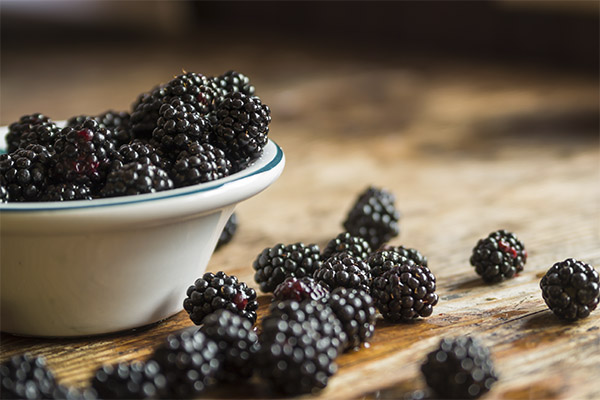
- Choose berries that are moderately firm to the touch, slightly plump, dry and have a uniform dark purple color.
- Avoid berries that have a color that is not characteristic of blackberries.
- Beware of mold on the fruit.
Eat the berries as soon as possible because blackberries do not have a long shelf life. They can go bad after only two days. Here are some tips for storing them:
- You should not wash blackberries in advance, but only just before eating them.
- Unwashed berries should be stored in the refrigerator in a plastic airtight container.
- Soft, overripe berries should be removed.
- Crushed or moldy berries should be discarded.
- Fresh blackberries usually keep for about 2 days, but they can be frozen, then the berries can be enjoyed year-round.
Important: The daily rate of consumption of blackberries - about 50 grams.
What can be made with blackberries: Recipes
Compote
Ingredients:
- Blackberries - 1 kg.
- Sugar - 0,5 kg.
- Water - 3 liters.
How to prepare:
- Sort the spoiled berries, remove the stalks, wash.
- In a large saucepan (not aluminum) pour water, bring to a boil.
- Pour the berries into the pan. Once the compote boils, let the fruit simmer (4-5 minutes).
- Pour the sugar and boil again (5 minutes).
- Once the drink has cooled, put it in the fridge.
Smoothie
Ingredients:
- Blackberries - 1 cup.
- Banana - 1 piece.
- Milk (cooled) - 1 l.
- Sugar - 0,5 t.
How to prepare:
- Peel the banana, cut it into small pieces and put it together with the blackberries in a blender.
- In a blender add milk and sugar and beat (about 3 minutes), then pour the mass into the glasses.
Jam
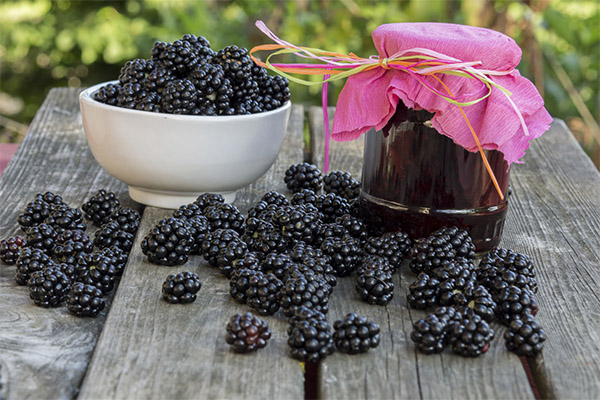
Ingredients:
- Blackberries -1 kg.
- Sugar - 1 kg.
How to cook:
- Sort blackberries, remove spoiled berries.
- Wash and tear off the stalks. When the water has drained from the berries, place them in a saucepan (with a large diameter bottom) or in a special bowl for jam. Sprinkle with sugar.
- Carefully stir the berries, trying not to damage their integrity.
- Set aside candied berries for 30 minutes until the juice flows out. Slowly heat while stirring. Cook for about 30 minutes.
- Then put the berries into sterile jars and seal them.
- Store in the refrigerator.
Frozen blackberry morsel
Ingredients:
- Blackberries (frozen) - 400 g.
- Water - 900 ml;
How to prepare:
- Rinse the berries well, clean off the tails and twigs.
- Put berries in a blender and pour water in it.
- Beat until a homogeneous mass.
- Then put gauze on a colander and strain blackberries.
- Press out the gauze and pour the liquid obtained into glasses.
Blackberry sauce with meat
Ingredients:
- Blackberries - 500 g.
- Wine (red semi-sweet or homemade cherry) - 150 g.
- Salt - 0.5 tsp.
- Sugar - 1 tsp.
- Vinegar (apple or wine) - 30 gr.
- Soy sauce - 1 tbsp.
- Honey - 1 tsp.
- Garlic - 2 cloves.
Mixture of spices (by pinches: hot red pepper, coriander, hop-suneli, ground nutmeg) - 2 tsp.
How to prepare:
- Wash blackberries, put berries in a saucepan, add wine and boil for 2-3 minutes.
- Mashed potato the rest of the berries, add all the ingredients (except honey) and minced garlic, and simmer on a low heat until thickened (15-20 minutes).
- Add honey and turn off heat. Leave it to cool down.
- The resulting sauce should infuse for 2-3 days.
Interesting facts about blackberries
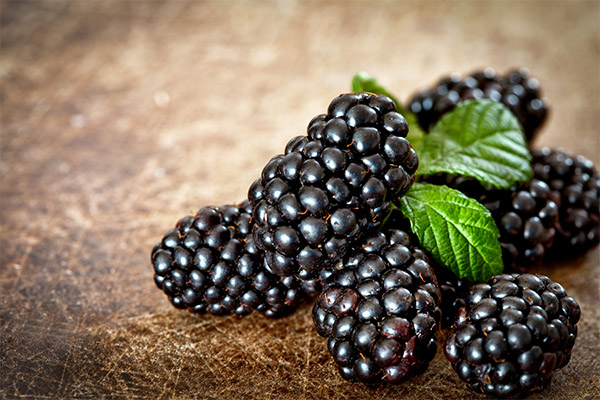
- What distinguishes blackberries from their raspberry relatives is that the core remains with the berry when plucked.
- Blackberries, like most berries, are rich in antioxidants, fiber and many other healthy nutrients.
- In some countries, there are beliefs that the color of blackberry juice is the same as the blood of Christ. Some also believe that the wreath of thorns that was placed on Christ's head was made from a blackberry bush.
- The berries are very perishable and can only be stored for a few days after picking.
- The very dark color of blackberries indicates the high antioxidant content of the berries.
- In ancient times, blackberries were used by women in labor to relieve labor pains.
- The nutrients in blackberries help improve immune function, vision, digestion, memory, brain function, skin condition, as well as strengthening the heart, cancer prevention, weight control, strong bones, and blood clotting.
- Blackberry leaves serve as food for caterpillars and for some mammals (deer).
- The Greeks used blackberries as a treatment for gout, and the Romans made tea from the leaves to treat various diseases.
- Blackberries were used to make desserts, jams, jellies, and sometimes wine. Blackberries were also used to make candy.
- Sometimes you may notice that blackberry plants begin to take on an orange hue. The berries of such a plant are no longer suitable for consumption. This is a serious fungal disease that is not treated.
«Important: All information on this site is provided for informational purposes only for educational purposes only. Before applying any recommendations, please consult with a specialist. specialist. Neither the editors nor the authors shall be liable for any possible harm caused by materials."

